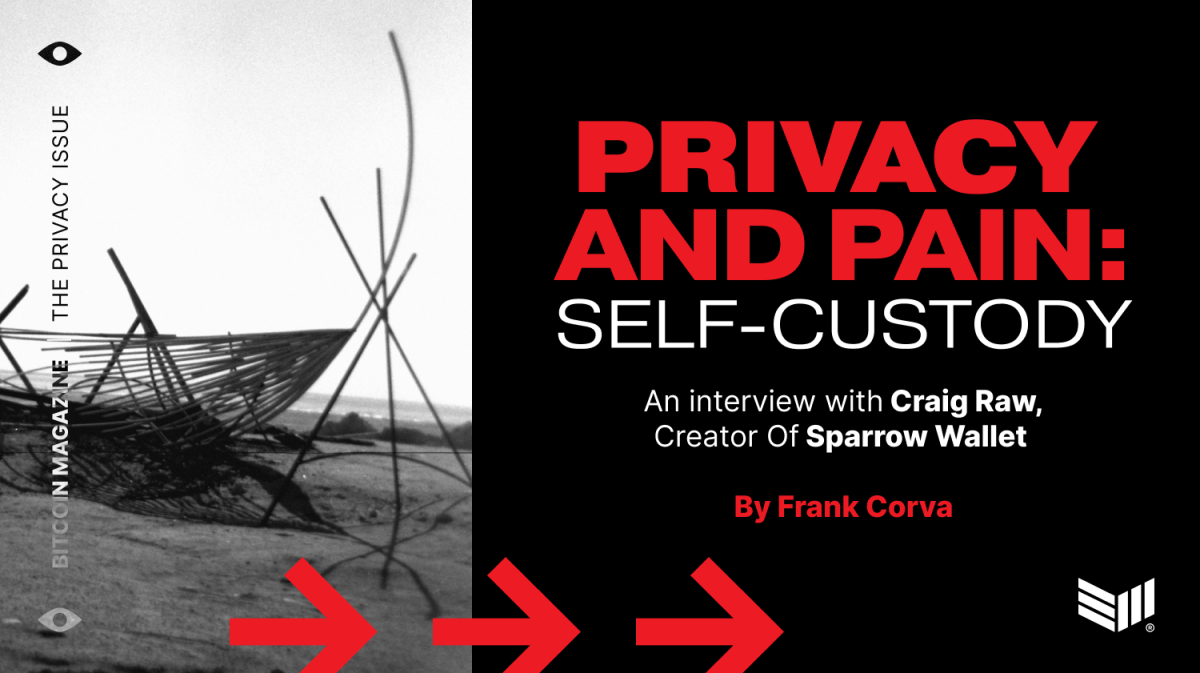Month: September 2024
Privacy and Pain: Craig Raw, Creator Of Sparrow Wallet, On Self-Custody
This article is featured in Bitcoin Magazine’s “The Privacy Issue”. Subscribe to receive your copy.
When Craig Raw talks, you listen.
His deep voice has a gravity to it, bolstering the urgency of the points he makes.
It’s like that voice in the back of your head that you hear when you’ve left too much bitcoin on an exchange for too long. Or that voice that persists when your bitcoin stash isn’t quite as secure as you know it could be.
It’s an uncompromised voice, constantly reminding you to follow best practices when it comes to storing and using your bitcoin.
Weeks after interviewing Raw — creator of let Sparrow Wallet, a free and open-source Bitcoin desktop wallet beloved by Bitcoin enthusiasts worldwide — for this piece, both the tone of his voice as well as what he shared with me in our interview are still fresh in my mind.
He’s concerned that the rhetoric around the importance of privacy and self-sovereignty as it pertains to Bitcoin is eroding and wants to remind you that both of these concepts are of the utmost importance as we move into an era where more and more bitcoin is KYC’d and/or held custodied within walled gardens (e.g., spot bitcoin ETFs).
So, if privacy and self-sovereignty mean something to you, please heed Raw’s words. Learn from the tips he shares, highlighted in this piece, as well from simply using and (carefully) experimenting with Sparrow Wallet.
If you choose not to, you may end up experiencing a certain pain, which, while it may be a good teacher, would otherwise have been avoidable.
PRIVACY
When it comes to storing and using your bitcoin privately, it’s important to start with the basics, according to Raw.
“The first thing is to try and understand what Bitcoin is — to try and understand the UTXO model,” Raw told Bitcoin Magazine.
“Try and understand the ways in which you can be more private without using any particular kinds of privacy tools,” he added.
He went on to provide two examples of how to do this:
Example 1: Don’t Reuse Addresses
“Address reuse is unnecessary and generally is [a] very, very poor [practice],” warned Raw. “It leads to transactions being correlated on-chain.”
Example 2: Don’t Use Rounded Amounts
“If you create a transaction and your amount is a round number, then there’s a change output and it’s very easy to see which is which,” he explained.
To expand on what Raw means in this second example, when you spend an uneven amount of bitcoin (e.g., 0.0010126 BTC), it’s more difficult for someone watching the blockchain to decipher which UTXO is the payment and which is the change. This makes it more challenging for the observer to follow your UTXO into the future.
The inverse is true if you spend an even amount of bitcoin (e.g., 0.001 BTC). The observer can more easily intuit which UTXO is the payment and which is the change.
Both reusing addresses and using rounded amounts are “common pitfalls that people don’t necessarily consider,” said Raw.
In addition to employing these two practices, you can use Sparrow Wallet to further increase their privacy.
“Sparrow offers two forms of transactions,” explained Raw. “You can either use the efficiency form, which minimizes fees, or you can use the privacy form, which constructs what we call a ‘fake two person coinjoin.’”
Raw on Sparrow Wallet’s privacy form transactions:
“The privacy form is a more complex transaction where it looks like you could have two people bringing funds into a transaction and then two outputs of the same amount. Anyone looking at that is looking at a transaction with more entropy, with more confusion in it. Even if you know that it’s a fake two-person coinjoin, you still have to follow both of those two outputs if you’re trying to follow a change of ownership flow in that transaction graph. So, that’s more expensive, but it’s a useful way to be able to create a more private transaction.”
But what about those who don’t want to bother with UTXO management? Isn’t it just easier to use hardware wallet interfaces like Ledger Live or Trezor Suite that handle UTXO management for you?
Raw seemed unaffected as I played the role of devil’s advocate in posing these two questions. He made the case in his gravelly voice that users sacrifice privacy, or their funds, when they neglect UTXO management.
“You can’t really abstract yourself away from the complexity of what Bitcoin is,” posited Raw. “If you want to transact on Bitcoin, you’re going to need to, at some stage, be aware of what you’re doing. Otherwise, you’re likely to lose your funds or destroy whatever privacy you have.”
He went on to share that wallets with simplistic interfaces that display your Bitcoin balance as if it were a bank account balance are doing a disservice to the user.
“The wallet is handling a lot of the detail for you underneath,” shared Raw. “And it simply doesn’t know — it cannot know — the right decisions to make.”
Raw then contextualized this statement, highlighting the fact that certain wallets don’t know the right decisions to make IF you’re looking to preserve privacy in your transactions.
“If you received some funds from somewhere and then you spent those funds somewhere else, you are creating a cryptographic link on the chain which anyone can see,” he explained. “If somebody knows the identity of either of those two sides, they can start to link things up. That is a dangerous thing that I don’t think people are aware of.”
He likened this scenario to all of your text messages suddenly becoming public — with your name linked to them.
“It’s like if we all had our chat apps and everybody could see everything everyone said and associate an identity to it,” Raw explained. “What we’re talking about is the same thing, but on a financial level.”
Raw doesn’t think most Bitcoin users are ready for this level of transparency.
He believes people should consider whether or not they’re comfortable with publicly broadcasting information that can lead others inferring what they earn or with whom they transact. If they’re not, then they might consider taking UTXO management more seriously with the help of Sparrow Wallet, which displays users’ UTXOs by default instead of hiding them.
“Sparrow is trying to give users an ability to understand what it is that they are doing, to be more safe in their transactions from a security and privacy point of view by giving them the information that they need in order to be able to manage that kind of thing.”
One of the most refreshing things about Raw is that he doesn’t underestimate Bitcoin users. He seems to think of them as both capable and willing to learn, which is, in part, driven by the fact that we all value our privacy — whether we’re conscious of it or not.
“Even those who say, ‘I don’t need to be private’ [might change their mind] if they just spent a moment considering that they wouldn’t like their bank accounts or their email inbox and so forth to be open to everyone in the world. And that is effectively what we have with an open blockchain,” explained Raw.
“I don’t think it is nearly well understood enough, even amongst Bitcoiners, exactly how open and transparent the blockchain is,” he added.
“They may not have privacy from their bank or their government today, but they certainly have privacy from other individuals.”
THE THREAT TO PRIVACY
While neglecting UTXO management is a threat to privacy, it’s not the threat to privacy, according to Raw. The threat, said Raw, is the ability — and desire — of Bitcoin users to self-custody their bitcoin.
To illustrate how dangerous giving up custody of your bitcoin is, Raw provided a theoretical example of what relinquishing self-custody would look like if taken to the extreme:
“Let’s say we have one bank in the world and that bank says, ‘Give me your bitcoin and I will give you an IOU.’ In that situation where everyone transfers their bitcoin over to that bank and the bank issues IOUs, the bank effectively has carte blanche to issue as many IOUs as they want. We’re effectively then back in the fiat world, even if we have bitcoin. I think that that’s the biggest risk that Bitcoin faces today — the desire for people to self-custody the funds that they have.”
Does this mean that if you use a custodial bitcoin platform for even a second, you’ve betrayed a core Bitcoin tenet and should be excommunicated from the Church of Bitcoin Maximalism?
No.
At least not in Raw’s estimation.
“I think we just need to be very careful about relinquishing too many of those original ideals,” said Raw about ideals like oft-cited ‘not your keys, not your coins.’”
At the same time, Raw believes that “Bitcoin doesn’t exist in a vacuum” and that it’s the “product of the environment in which we live today.”
He shared that Wallet of Satoshi, a custodial Bitcoin Lightning wallet, has been a useful tool for the Bitcoin Ekasi project — a circular Bitcoin economy based in Raw’s home country of South Africa.
While Raw admitted that Wallet of Satoshi is “obviously not ideal from a self-custody point of view,” he also shared that “it does nevertheless get people used to [using bitcoin], and there’s something powerful about that.”
Raw seemed less concerned with the idea that people would use Wallet of Satoshi for small, everyday transactions and more concerned with the idea that many stop after downloading and using a custodial app like Wallet of Satoshi and don’t get around to learning about self-custody.
Like many of us who’ve tried to onboard friends and loved ones to Bitcoin, stressing to them the importance of holding one’s own keys, Raw gets that many unfortunately still don’t get it, partially because many have yet to feel the pronounced sting of currency debasement.
“We clearly get the pushback of ‘Why should I care? Why should this matter to me?,’” said Raw.
The idea of having to exit the traditional monetary or financial system in efforts to preserve your wealth “doesn’t seem very real” to many around the world, he argued.
But for those who’ve lived in highly inflationary environments, learning how to properly use bitcoin isn’t a cognitive exercise — it’s something they resort to instinctively.
“If your currency gets devalued by 25% overnight, then it really does become quite material to you to think ‘How do I protect myself against this?,’ Raw added.
This is why Raw advises people to learn best practices when it comes to using Bitcoin before they’re thrown into a scenario in which they have to start using it. He makes this case despite the fact that he understands quite well that the greatest Bitcoin teacher is not a person or a certain class, but a feeling that we all often do our best to avoid: pain.
PAIN
“Maybe they start with the Wallet of Satoshi, and maybe, if the worst comes to worst, that particular service goes away,” theorized Raw.
“They lose their funds, they have a painful lesson, and then they look for something better in future. I’m sure you are familiar with that journey. [Author’s note: Of course I am.] Many of the people I’m sure you have spoken to have lost funds and have learned painful lessons along the way [Author’s note: Of course they are. Many have told me this directly.],” he added.
“What’s interesting, I find, is they often don’t walk away for good. They come back; they try again. They try with those learnings that they’ve managed to gain.”
So, does Raw wish this pain on people? I didn’t get that impression.
He’s not cruel; he’s concerned.
He also comes off as more of a realist than an idealist.
And he thinks that pain will not only compel people to be more careful about how they store the private keys but about how private they keep their transactions, as well.
“We don’t have nearly enough focus on public opinion behind privacy, and I think the only way we’re going to get there is, as is often said in the space, from people touching the stove,” said Raw.
“We need that collective pain — unfortunately. I wish it weren’t so, but unfortunately, I think it is necessary in order for people to take the idea of privacy seriously,” he added.
Raw went on to share that he believes that collective pain is coming and that it’s likely necessary for us as a society to truly recognize just how much we value privacy — a cornerstone of civil society.
“Without the ability to be private, we cannot have a free society. It is simply not possible,” deadpanned Raw. “So, if people want to be free, and I believe that, in general, that is true, then they will need to realize at some point that they need this concept of privacy and the ability to have it in their own lives in order to achieve that goal.”
The good news is that while this wave of collective pain may wash over society, you can do something to insulate yourself from it. You can download Sparrow Wallet after you finish reading this article and begin to work through some of the discomfort that comes with learning to use new technology — which will likely be less painful than having your financial information doxxed.
The Less Painful Path
Luckily for us, Raw designed Sparrow to be intuitive, leading more curious users down a path that educates them if they’re willing to spend some time tinkering with the software.
“Sparrow was always designed to be not just a Bitcoin wallet but an educator, as well,” explained Raw.
“That’s why I’ve tried to put as much detail as I can into it. I designed it in a way, and I hope I’ve got this right, that gradually reveals information to people who want to dig deeper into things,” he added.
“You can use Sparrow in a fairly light way, and you should when you’re just getting into it. But, as time goes on, there’s no harm in clicking or hovering over things, reading the tool tips, and trying to understand more about what you’re doing.”
What’s perhaps most remarkable about what Raw has built is that he’s created it and given it to the world for free. Raw doesn’t monetize Sparrow Wallet. As mentioned earlier, it’s free and open-source software that he continues to iterate upon for no reason other than he “believe[s] that it has some value.”
For someone who realizes just how much is at stake in a world where the powers that be are trying their best to trap us in a panopticon, Raw’s work keeps him optimistic.
“Ultimately it comes down to, for me, the simple idea that Bitcoin is hope,” Raw concluded, with his stern voice softened for just a moment.
“What is hope? Hope is the idea that tomorrow can be better than today, that one can look forward to something. Bitcoin represents that. That’s why it’s the key driving force above everything else to me.”
Download Sparrow Wallet: https://sparrowwallet.com/download/
Questions From The Plebs:
The following questions were crowdsourced from X.
Will you ever create a Sparrow mobile app?
The desktop computer is the most capable device that many people have when they are looking to do self-custody of their funds. That’s really what Sparrow is for.
When it comes to the real important self-custody operations, you want to use the most capable device that you own. It gives you the most screen real estate to display the full context of what you’re trying to do.
There’s a limitation on mobile devices, which is natural just due to the size of the screen. You can see the obvious difference if you are using a mobile app versus using something like Sparrow. There’s a big difference in terms of the amount of information that you can show. So, for me, it was natural to want to focus on the desktop.
I think that there are pros and cons in terms of security on both. Personally, I believe that the desktop can be made a more secure device than the phone. Again, I recognize that there are certain times when that isn’t true, but in general, I think it’s true. That’s the most important thing.
The decisions you make at the start of a project echo throughout its life. It’s really important to make good architectural decisions at the very start because that will inform everything further down the road.
Is using ecash created from protocols like Cashu and Fedimint a good way to preserve transaction privacy?
It’s too early to say. If you’re talking about a project that hasn’t really even reached a meaningful production level yet, it’s just really too early to say. They haven’t been put to the test.
They’re certainly interesting. I think really from a technological point of view, there’s a lot of positive things to be said, but from an actual implementation and a regulatory point of view, they haven’t been put to the test yet. We’ll just have to see.
I will obviously keep an eye on all of those things, but I think people should treat any new technology with a great deal of caution before they trust any significant amount of funds to it.
Will you ever integrate Lightning into Sparrow Wallet?
The best I can say is not at this time. I’m really focused on the ideal of financial self-sovereignty and that’s really, at this stage anyway, on the sort of on-chain level.
Now, there might be a time in the future where, for example, fees are too high and it’s not practical to do that anymore. We simply don’t know the way that things are going to play out.
Right now, Sparrow is a desktop app. It’s a client app. It’s not designed to be a server. It’s not designed to be run all the time.
If you’re trying to design something for Lightning, you very quickly run into this idea of needing to be online to receive funds. As soon as you start to work with that requirement, you get into a lot of complexity around “Am I online? What happens if I’m not online? Do I then need a third party involved?”
As I said, the decisions you make at the start of a project echo through its life. Sparrow is good at what it does. It’s an app that is designed for self-custody, for cold storage, and the important thing about cold storage is that it should be cold. You shouldn’t be necessarily running your cold storage wallet open on Sparrow all the time. That wallet should be closed, and you should be able to close Sparrow, as well.
So, as soon as you start to move away from those key goals, you’re trying to find some kind of compromise, and that needs to be treated with a lot of caution because it’s a different thing than what I’m building today.
FBI Warns of North Korean Hackers Targeting U.S. Bitcoin And Crypto ETFs
Today, the FBI issued an alert warning that North Korean hackers are targeting U.S. cryptocurrency exchange-traded funds (ETFs) in a bid to steal digital assets. The hackers are using advanced social engineering techniques to breach the security of companies associated with these financial products, the FBI stated.
According to the FBI, the Democratic People’s Republic of Korea (DPRK) has been conducting highly targeted social engineering attacks on employees within the decentralized finance (DeFi) and cryptocurrency industries. These attacks involve detailed pre-operational research and customized scenarios designed to exploit the victim’s specific interests and connections.
“North Korean malicious cyber actors conducted research on a variety of targets connected to cryptocurrency exchange-traded funds (s) over the last several months,” the FBI said. “This research included pre-operational preparations suggesting North Korean actors may attempt malicious cyber activities against companies associated with cryptocurrency ETFs or other cryptocurrency-related financial products.”
The FBI emphasized that North Korean cyber actors are a persistent threat to organizations managing large quantities of cryptocurrency. Their tactics include impersonating trusted contacts, creating fake scenarios involving job offers or investments, and deploying malware through prolonged and convincing interactions with their targets.
The agency urged businesses in the cryptocurrency sector to adopt stringent security measures, including multi-factor authentication, limiting access to sensitive information, and verifying the identities of contacts through multiple channels. The FBI also recommended that companies with access to significant cryptocurrency holdings take extra precautions to safeguard their assets against these sophisticated cyber threats.
Dollar rises as traders eye data-heavy week; yen strengthens
Post Content
Relai’s Bitcoin Mission: Bringing Europeans the Orange Coin Despite the Red Tape
Company Name: Relai
Founders: Julian Liniger and Adam Bilican
Date Founded: July 2020
Location of Headquarters: Zurich, Switzerland
Amount of Bitcoin Held in Treasury: One-third of Relai’s treasury
Number of Employees: 30
Website: https://relai.app/
Public or Private? Private
Julian Liniger is on a mission to give more Europeans exposure to Bitcoin — despite regulatory bodies making it more difficult for Bitcoin businesses like the company he co-founded, Relai, to operate on the continent.
Liniger, a clean-cut Swiss entrepreneur who was one of Forbes’ 30 Under 30 in 2022, believes that there is much work to be done in bringing bitcoin to Europeans, even if new regulatory regimes like Markets in Crypto-Assets Regulation (MiCA) create more red tape around serving EU and UK citizens.
“We are working to make Bitcoin more accessible, easier to use and easier to buy for normal people,” Liniger told Bitcoin Magazine.
“We’re mainly targeting newcomers — the 90% of the people that don’t have easy access to bitcoin yet or that just haven’t tried yet because they were also not educated yet. In Europe, around 8% to 10% of people have bitcoin and 90% still don’t,” he added.
To reach this 90%, Liniger and the team at Relai have had to obtain the proper licenses and follow certain regulatory procedures, like requiring that customers complete Know Your Customer (KYC) procedures in order to use the app. Keeping Relai compliant is a tedious process, but Liniger, Libertarian-minded yet pragmatic, sees it as a necessary evil.
“I try to build the best company and onboard as many people as possible to Bitcoin in the most Bitcoiner way possible, which is certainly self-custodial and Bitcoin only, but we also need to stay in the realm of what is legal,” Liniger explained.
“So, we adhere to these regulations, whether I as an individual like it or not. As a business person, I need to make these decisions,” he added.
Wise words from someone who’s no stranger to taking the hard road.
The Road To Relai
Liniger was first introduced to bitcoin and cryptocurrency in 2015 and quickly went down the broader crypto rabbit hole.
In his early 20s, he watched bitcoin’s price skyrocket from $1,000 to $20,000 and experienced the Ethereum ICO boom from up close as he spent a portion of 2017 in San Francisco, then a hotbed for crypto developer activity, on an exchange semester while pursuing his master’s degree in business administration (MBA).
Upon returning home to Switzerland in 2018, he turned down a well-paid consulting job in the world of traditional finance and instead founded Bravis, a crypto consulting firm. During this time, he helped banks prepare to offer Bitcoin services.
“[We] helped them to position strategically in this new world and also to conceptualize some products, like actually starting to offer Bitcoin custody, trading, etc., which was inconceivable back then,” said Liniger. “Now, a lot of Swiss banks are doing it.”
By 2019, Liniger’s entrepreneurial drive had kicked into a new gear. He wanted to build something bigger than a consulting firm. This urge coincided with his personally adopting a bitcoin-not-crypto investment thesis and realizing that no app in the Swiss or broader European market allowed users to buy, non-custodially hold, and use bitcoin (all of which Relai does).
That same year, Liniger and his soon-to-be co-founder at Relai, Adam Bilicon, participated in a hackathon and made it into the finals with their concept for the company. By 2020, the two had built a prototype and had raised money from two angel investors. By summer of that year, the Relai app went live with the intention of first providing access to bitcoin and then offering other crypto assets.
The Bitcoin community didn’t like the latter notion, though.
Bitcoin Only
Liniger recalled introducing Relai’s promo phrase “easy crypto investing” and the instant backlash it drew from Bitcoiners.
“They were like ‘Why crypto? Just stick to Bitcoin and make it really great,’” said Liniger, adding that Relai’s users urged him and his partner to simply make the app as easy-to-use as possible and to incorporate then-new Bitcoin technology like Lightning, both of which Relai have done.
Liniger, who’d first conceptualized Relai as a Bitcoin-first crypto app, made the decision to make it a Bitcoin-only app.
“[I thought] it wouldn’t hurt to also have a couple other [cryptos],” recalled Liniger.
“But then I realized it actually would hurt. All the other [cryptos] don’t make sense in the long run if you want to be a savings app. Bitcoin is a savings technology; it’s digital gold,” he added, noting that other crypto assets neither purport to be or act as a store of value.
Liniger also noted that by 2020, both Bitcoin-only venture capital firms and more Bitcoin-only companies were beginning to arise, and he felt that Relai could be a part of this trend.
“We had River in the US, Bull Bitcoin in Canada, etc, and we were thinking we could be the leader of this category in Europe,” said Liniger.
Developing A European User Base
Based in Switzerland, Liniger and the Relai team had a leg up on the rest of Europe, as regulations in Switzerland are a bit more relaxed than those in the European Union. Liniger, however, did not want to just serve Swiss citizens for two reasons.
The first is that the percentage of Swiss citizens that own bitcoin is closer to 20%, according to Liniger, as compared to the 10% or so of Europeans from other countries. There’s less of a market for those who are new to Bitcoin to go after in Switzerland as compared to those living in the EU and UK.
The second reason is that Switzerland’s population is about 8.7 million, whereas the total population of the EU plus UK is over 500 million.
In the past four years, Relai has acquired 120,000 users across the continent and Liniger says the growth curve is accelerating even as the company faces certain regulatory impediments.
“We are not currently allowed to actively acquire users in the EU for regulatory reasons,” explained Liniger. “We can do active marketing tactics in Switzerland, but not in all the EU countries.”
Even in the absence of marketing, Relai continues to grow its user base, especially in Germany, Italy and France.
The number of Relai users in these countries will likely continue to grow rapidly as the company is in the process of obtaining licensing from France that will allow the company to advertise to EU customers.
“Probably by the end of this year, we will get the French license approval,” said Liniger. “Then, at the beginning of next year, there’s going to be MiCA and this [French license] is going to transition into a MiCA license, which will then allow us to actively acquire customers in all the EU.”
Once this happens, Liniger believes that upwards of 90% of bitcoin purchases in the EU and UK will happen via Relai.
The Cost Of Compliance
While Liniger, notably calm and level-headed, talks about the process of overcoming regulatory hurdles, one can’t help but imagine how frustrating the process has been for him and his team.
He stated that regulatory bodies and requirements have become significantly more intrusive for not only startups like Relai, but established financial institutions, as well.
“I heard stories from our CFO who used to work at ING, a huge bank, four or five years ago,” shared Liniger. “He was in one of these risk management compliance departments, which, when he joined, was like three or four people and the team has 10x’d in the four or five years since.”
Liniger went on to explain that many of Relai’s peers have up to a third of their team focused on regulatory compliance.
While he’s hopeful that the likes of Coinbase and Kraken fighting the US Securities and Exchange Commission (SEC) in court will set some sort of precedent that will get regulators to back off, he doesn’t see the trend of regulatory overreach reversing just yet, which seems slightly worrisome to him.
“We don’t have these resources at all,” said Liniger, comparing Relai’s funds to the type of money that Coinbase and Kraken have in their coffers to fight regulators in court.
This is part of the reason Relai didn’t fight back in court when regulators told them they had to KYC all of their customers.
KYC Required, But Do Not Despair
Relai recently announced that all users would have to provide their personal information by October 31, 2024 to continue using the app, after four years of being able to offer services without requiring users to do so.
“We were just basically forced to by the EU regulators and, increasingly, also from the Swiss regulators,” said Liniger in regard to having to make customers complete the KYC process. “The EU is pressuring Switzerland.”
While Liniger didn’t sound particularly happy about this, he also didn’t sound defeated. Instead, he seemed as focused as ever on his mission to bring bitcoin to the 90% of EU and UK citizens who still don’t have any.
“50% plus of the people will want some access to Bitcoin just because it’s a savings technology,” explained Liniger, which means he still has about 200 million customers (a 170x of Relai’s current users base) to reach in the broader jurisdiction Relai serves.
Admittedly, he knows some of these potential customers will opt to buy bitcoin or bitcoin ETFs that major financial institutions custody for them instead of using Relai, though he believes that the youth, who are more distrusting of established financial institutions, will opt to use Relai.
“The more progressive younger people will want to take custody themselves,” explained Liniger. “They will use something like Relai where they can buy directly into self custody and set up a savings plan, using it as a sovereign way of saving their money and their purchasing power into the future.”
Political Polarization in Europe threatens Euro stability amid rising extremism
Post Content
Why The DNC Doesn’t Care About Bitcoin
Two weeks ago I attended the Democratic National Convention. The chief reason I did so was to try and encourage an impartiality to our coverage of politics as it relates to the election and Bitcoin here at Bitcoin Magazine. Earlier this year we were invited the the Republican National Convention at the last minute, after David Bailey’s coordination with the Trump campaign began preceding his speaking at the Bitcoin 2024 conference in Nashville in July.
It bothered me to see people associated with this company taking such a one-sided stand with the Republican Party, despite the reality that in fact many more Republican politicians support Bitcoin compared to Democrats. The Republican Party even formally integrated Bitcoin into their public policy platform at the convention. The Democrats have not.
That is not to say that no Democrats support Bitcoin. At the national level Representative Ro Khanna from California, Ritchie Torress from New York, and Senator Kirsten Gilligrand also from New York have been vocal supporters of Bitcoin in Congress. These politicians exist, they are vocal, but they do not seem to have the same resonance with the rest of the party or their voting base that exists in the Republican Party.
During the first day that I attended, Bitcoin was not mentioned a single time. It wasn’t a very prominent topic at the RNC, but it was mentioned. It was included in the party policy platform. No such inclusion took place at the DNC. The focus of the first day was on the coming election, Kamala versus Trump.
I do have to say that not much of the discussion centered around policy. It was mostly rhetorical, and focused on general issues concerning Democratic voters, interspersed with the type of rah-rah language one would expect at an event focused on candidate selection for the Democrat party this election cycle.
While no policies explicitly were touched on, many of the issues that Democrats find important were. Minority inclusion, women’s rights, well paying jobs and union security, healthcare (especially as it relates to Covid which is still circulating even though people don’t place the same focus on it), and the perceived attempt by Republicans to roll back progress from the point of view of Democrats on many of these issues.
A number of union leaders spoke either in person or with recorded messages during the convention’s first day, the Arizona Pipefitters and Pumbers Union, the Communications Workers of America Union (CWA), International Brotherhood of Electrical Workers (IBEW), the American Federation of State, County, and Munipical Employees (AFSCME). All of them had much to say on the topic of lost jobs during Covid, and the recovery of jobs that took place under the Biden Administration. Another big issue was union pension funds. Union jobs are generally sought, and coveted, due to the benefits and retirement security that comes along with them, not simply the good base pay.
Is anything standing out to you? Maybe the fact that Bitcoin actually can synergize and help advance these goals that Democrats seem to care about?
Bitcoin can absolutely help minorities suffering economically, at least over long time horizons. Ignoring the aberration of this current market cycle, people holding bitcoin over long time periods have absolutely benefited from increased purchasing power. While obviously it takes money to make money, and people starting with less will realize less in terms of appreciation, anyone with money to save has historically in the long term wound up with more purchasing power. This won’t help people in poverty as much as those with a large surplus of money to invest, but it will help.
Bitcoin can also assist women in maintaining access to healthcare that is increasingly being banned in parts of the US. Financial institutions have increasingly been censoring financial transactions deemed troublesome culturally, despite their legal status. There is no reason to assume that this activity will continue only affecting people on the right side of the political spectrum. Bitcoin is an alternative to traditional financial institutions. And I shouldn’t need to tell people that it can function even for services that are outright deemed illegal.
Pension funds for workers have also recently started taking conservative exposure to bitcoin, which again looking at historical long term performance can be a huge benefit to solvency issues in the long term facing pensions all over the country.
Bitcoin can even be a massive boon to renewable energy, something liberals care very deeply about as it relates to mitigating the consequences of global climate change and maintaining our natural environment. Bitcoin miners are in a very unique position, with AI operators only recently starting to fill a similar niche, to be buyers of stranded renewable energy before it becomes connected to the grid. This allows revenue the instant these projects are finished, rather than having to wait to be connected to retail energy consumers on the grid.
That is to say nothing about the general open access nature of Bitcoin, and how it can advance the philosophy of freedom and inclusion globally by providing people with an option in the face of fighting and resisting totalitarian regimes worldwide. Bitcoin is a natural fit for many of the proclaimed beliefs and principles of Democrats.
So why is there no attention from the Party at large? Why is there no mention or inclusion in their policy platform similar to Republicans?
It’s the base. The recent American Bitcoin Survey by the Nakamoto Project showed us that bitcoin ownership is a bipartisan thing, that it is not concentrated on the right as is generally perceived in the public. So why does that perception continue to exist? Narratives. Stories. Messaging. The reason the Democratic Party does not care as widely about Bitcoin as a policy issue isn’t because Democrats and liberals don’t use it or hold it, it is because of the wider narratives. The perception is that Bitcoin is a rightwing thing. The associations made between Bitcoin and important issues come across as rightwing.
Democratic politicians at large are not going to care about Bitcoin in terms of policy, and cater to Bitcoiners with positive policy, unless those narratives and associations change. This is the reality of politics, politicians cater to their voters. They do not generally take forward thinking initiatives on their own unless they see some benefit in terms of positive voter reaction and perception towards that initiative. This is politics.
Shouting at politicians won’t change that, demonizing them for apathetic or negative reactionary responses to the perception of it being rightwing in a polarized political climate won’t change that. You need to reach the voting base. That is the only thing that will cause a change in attitude and action on the part of Democratic politicians. People who are on the left need to be shown that Bitcoin is something that aligns with and can advance their political goals and agendas, the same way that wider perception has been propagated on the right.
It will definitely be an uphill battle given the baggage of past and existing perception, but this is the only way that the increasingly cemented perception of Bitcoin being a rightwing thing can be pushed back against. Without concerted effort to demonstrate and build narratives showing left leaning people that Bitcoin can, and does, align with their values, Bitcoin is doomed to be forced into a left/right partisan paradigm.
Why is CHF not weaker? BoA Securities explains
Post Content
Bitcoin Hashrate Records New ATH Surpassing 740 EH/s
The Bitcoin network hash rate reached a new all-time high on September 3rd, surpassing 740 exahashes per second (EH/s). This comes even as Bitcoin prices trade below $60,000.
JUST IN: #Bitcoin‘s hash rate hit a new ALL TIME HIGH 🚀 pic.twitter.com/BiLY3pRRIV
— Bitcoin Magazine (@BitcoinMagazine) September 3, 2024
A higher hash rate reflects more computational resources spent processing transactions and mining new Bitcoin. This is despite Bitcoin sliding over 10% this week, which highlights the disconnect between network fundamentals and short-term pricing.
Leading mining companies such as Whatsminer and MicroBT are launching advanced machines to take advantage of the surge in hash rate. Whatsminer has introduced four new mining rigs and a forthcoming solar-powered mining container system. Meanwhile, MicroBT has rolled out its M6XS+ miners, capable of processing between 190 and 450 terahash.
Riot Platforms also purchased Block Mining for $92.5 million to enhance its hash rate and broaden its market presence. Additionally, miners are looking into AI integration and potential acquisition opportunities to address persistent identity challenges in the industry.
Bitcoin’s rising hash rate indicates strong confidence in its long-term sustainability. With significant advancements in mining technology and supportive political conditions enhancing profits, miners are rapidly expanding their infrastructure to handle transactions and secure the Bitcoin network.
While the hash rate doesn’t directly influence Bitcoin’s price, it reinforces the underlying network security. Hashrate milestones also tend to precede bullish market moves and Bitcoin’s halving events.
Dollar steady ahead of ISM release, key labor market data
Post Content
Dollar up ahead of the key jobs report
Post Content









